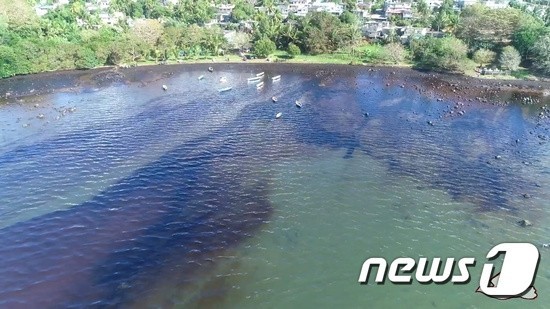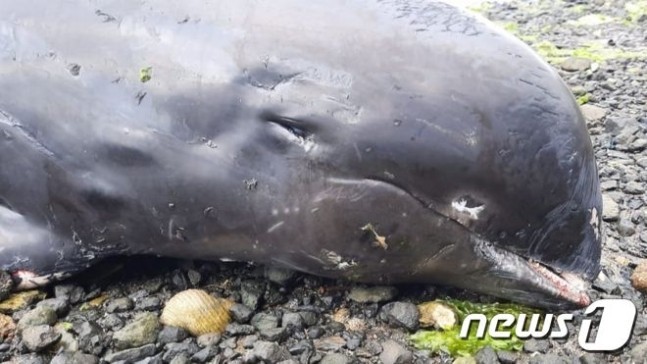On July 25, a Japanese cargo ship ran aground off the coast of Mauritius in Africa. And on August 6, the oil stored in the destroyed cargo ship began to leak into the ocean. By the time it was contained, 1,000 tons had spilled into the sea. Mauritius is famous for eco-tourism, so the accident was an environmental and economic emergency for the nation and people started donating their hair to support the clean-up effort. Why did they do this? Well in 1989, American hairdresser Phil McCorry saw a sea otter covered with oil in a video and thought 'Wouldn't human hair be able to soak up the oil?' He tested his idea by dipping a stocking filled with human hair in a tub of oil. The substance was sucked into the stocking and a new idea to mitigate oil spills was born.
 |
| ▲ Oil spill off the coast of Mauritius. (Photo from news1) |
So what is the scientific basis for saving the ocean with hair? Hair absorbs oil in the air naturally. This is because the surface of hair absorbs pollutants. Therefore, it is possible for it to act like a sponge absorbing any spilled oil. The collected hair is made into a long adsorption mat, similar to putting hair in stockings, and laid across the affected areas drawing the offending substances from the sea. The fact that hair can save the ocean was verified by the National Aeronautics and Space Administration (NASA) in 1998. Dr. David Glover, who was commissioned to study the idea, estimated that putting about 11,000 km of hair in a nylon bag could absorb 640,000 liters of crude oil. NASA still recognizes the validity of this technology, making it easier to resolve future marine pollution disasters. Many tools can remove oil from water such as sugar cane leaves, rice straws, animal hair, and absorbent paper, but human hair is the most absorbent of the group. Hair is an ideal material for eliminating crude oil because it is cheap to secure and can be recycled as a natural resource. Therefore, environmental organizations are actively trying to promote this method of oil extraction.
Many countries have begun to use hair to recover from oil spills. In 2006, an oil spill on Guimaras Island in the Philippines used human hair recover a large amount of oil flowing out to Panaiman. The government led a hair-gathering campaign and 11,000 prisoners joined this campaign. Also, in 2007, the coast of Taean in the West Sea of South Korea was covered with oil. It was recorded as the most serious marine pollution accident in South Korea. At this time, a project to collect hair was carried out on the Internet and netizens eagerly took part.
 |
| ▲ Carcasses of dolphins found off the coast of Mauritius. (Photo from news1) |
Once oil spills into the natural environment, our ecosystems are fatally damaged. Despite the fact that it is difficult to completely remove the oil once been released into the ocean, spills are continuing to occur all over the world. It is best to do more to prevent oil spills, but if not, we hope to see people around the world continuing to cooperate in hair donation campaigns. And it is hoped that the much-damaged Mauritius coastline can restore its waters’ pristine condition soon.
최윤서, 서영진 dankookherald@gmail.com

![[Campus Magnifier] Let's Surf the Library!](/news/photo/202404/12496_1765_4143.jpg) [Campus Magnifier] Let's Surf the Library!
[Campus Magnifier] Let's Surf the Library!
![[Campus Magnifier] Let's Surf the Library!](/news/thumbnail/202404/12496_1765_4143_v150.jpg)





